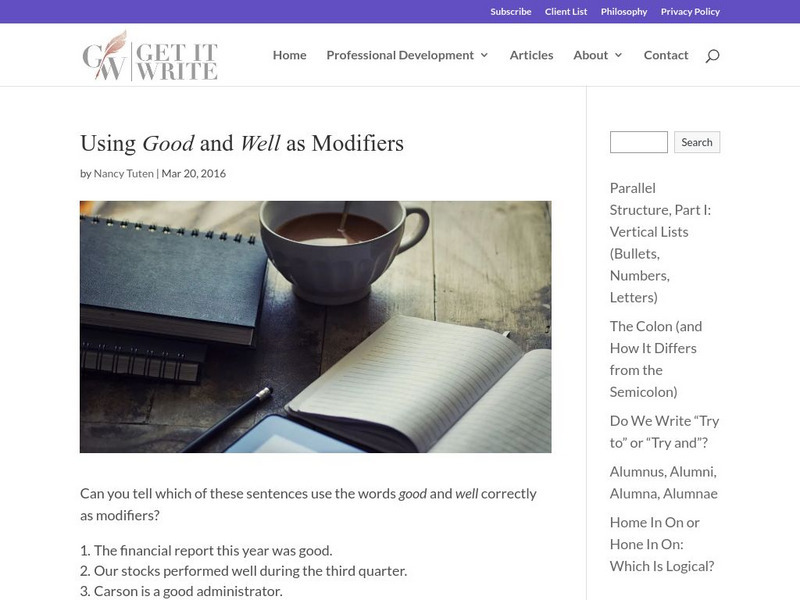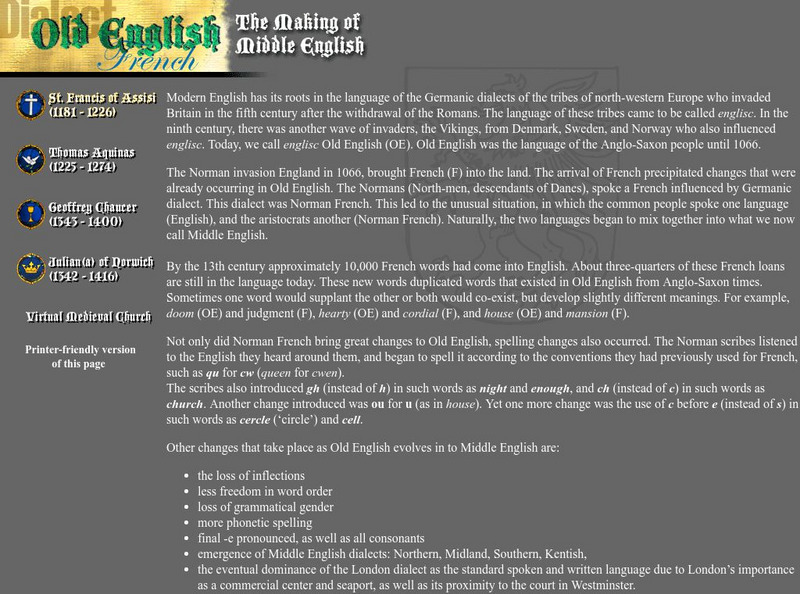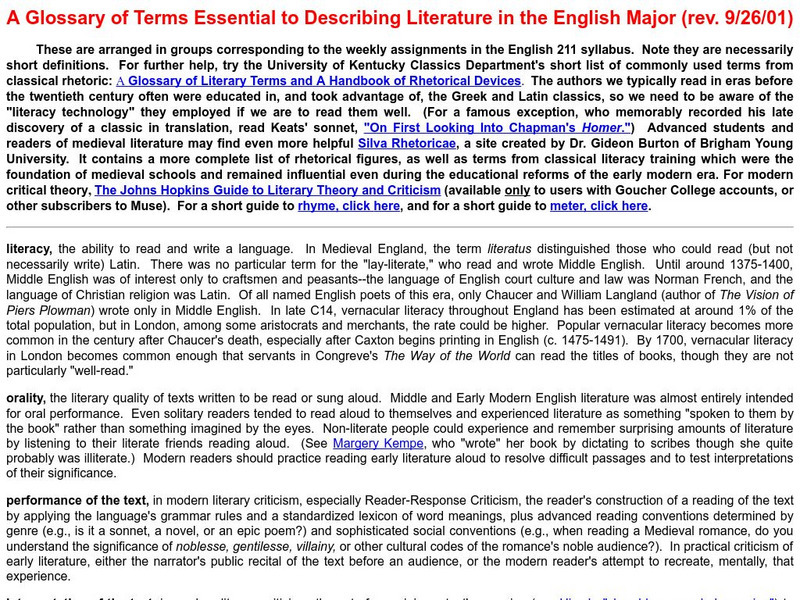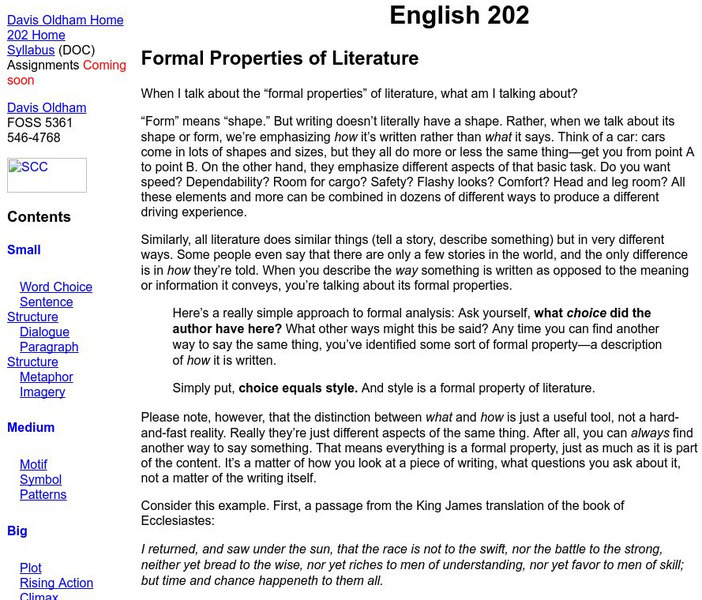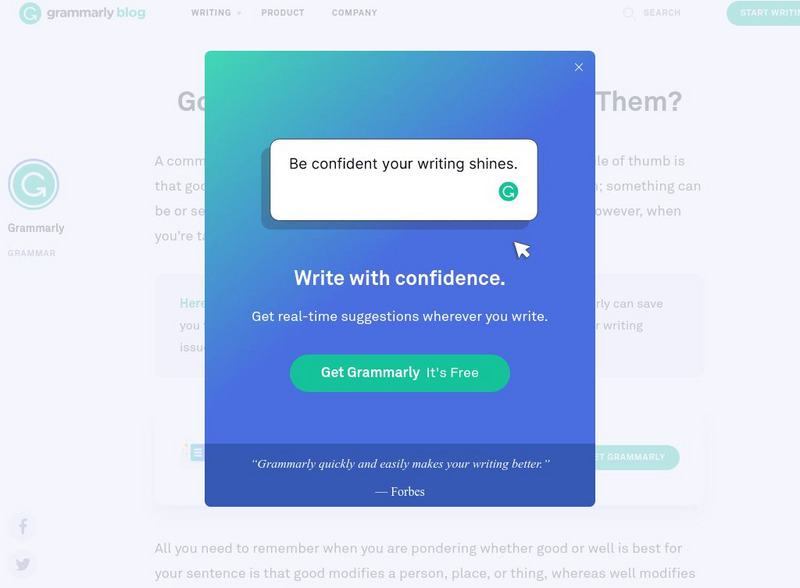Hi, what do you want to do?
Online Writing Lab at Purdue University
Purdue University Owl: Academic Writing: Levels of Formality
Basic information explaining how the context, i.e., the audience and your purpose, determines whether you should use formal, semi-formal, or informal language. The links on the sidebar provide much more information about formal academic...
Towson University
Towson University: Ows: Commonly Confused Words: Connote / Denote
This entry focuses on the commonly confused words connote and denote including providing an explanation, examples, and a link to a quiz/exercise.
Towson University
Towson University: Ows: Commonly Confused Words: Judicial / Judicious
This entry focuses on the commonly confused words It's and Its including providing an explanation, examples, and a link to a quiz/exercise.
Writing Fix
Writing Fix: Animals Not to [Verb] With
In this lesson, students will create 4 original poems within a particular rhythm and rhyme scheme.
Get It Write
Get It Write: Using "Good" and "Well" as Modifiers
This site provides an explanation for using "good" and "well" properly. A self test is given at the end of the article.
Get It Write
Get It Write: Here and There
Be sure you know what you are saying when using the words "here" and "there" at the beginning of a sentence. These grammar tips explain how you need to pay attention to the subject of your sentence in order to use the correct verb form....
Get It Write
Get It Write: Using a Comma Before "And" in a Series
This article discusses the correct use of a comma before the word "and" in a list. In addition to clear explanations and examples, there is a self-test with answers. L.11-12.1a Gram/Usage changes, L.11-12.1b Usage issues
TED Talks
Ted: Ted Ed: Mining Literature for Deeper Meanings
Writing a great English paper can be tough because literature doesn't always reveal its deeper meanings immediately. Amy E. Harter offers a few tips on how to read and write more critically and thoughtfully. [4:12]
Other
D'youville College: Subject Verb Agreement
After defining subject-verb agreement and giving examples, this site answers several frequently asked questions about subject-verb agreement. Links to separate exercises are provided.
Other
University of St. Thomas: Virtual Medieval Church: The Making of Middle English
Details the changes as a result of a fifth-century invasion in Britain, causing the English and Norman French languages to combine to create what is known as Middle English. Part of William Caxton's prologue to the Eneydos is presented...
Other
Goucher College: A Glossary of Terms Essential to Describing Literature
An exhaustive list of literary terms and techniques with explanations that often include examples, prepared for a college-level survey course in English literature.
Other
Shoreline Community College: Formal Properties of Literature
As students become more aware of text complexity, an understanding of the formal properties of literature becomes more important. This is an excellent examination of the kinds of choices writers make that change the way readers receive...
Bartleby
Bartleby.com: Elementary Rules of Usage
Passage from William Strunk's "Elements of Style" explains how the placement of a participial phrase determines if it refers to the subject of the sentence. Examples.
University of Victoria (Canada)
The U Vic Writer's Guide: Literary Term: Epithet
This site from The UVic Writer's Guide provides a general description of the word "epithet." Content also includes a literary example.
Grammarly
Grammarly Handbook: Sentence Style
A list of three techniques used to develop sentence style: Sentence Variety, Sentence Emphasis, and Wordiness. Each technique links to more information.
Bartleby
Bartleby.com: Cambridge History of Eng and Am Lit: Later National Literature: P3
This encyclopedia, "The History of English and American Literature" provided by Bartleby.com, includes some information about regional dialects during the 19th and 20th centuries. Check out section XXX 'The English Language in America'....
Grammarly
Grammarly Blog: Anymore vs. Any More
This page explains the use of "anymore" in informal writing, but in formal writing and anywhere else, "any more" is preferable. Examples are provided.
Grammarly
Grammarly Blog: Anytime vs. Any Time
This page focuses on changes in language usage pertaining to "anytime" and "any time." In informal writing "anytime" can be used, but in formal writing "any time" is perferable. Examples are provided.
TES Global
Tes: Spoken Language Study Teaching Resources 11 20
[Free Registration/Login Required] This 20-page word resource discusses the topic of "Slang" for students. Practice exercises and notes are provided. L.11-12.3 Language Functions/Style
Other
Online Etymology Dictionary
The site, created by an avowed amateur, Douglas Harper, shares the origins of words. Students will type a word into a text box and click a "search" button to see the etymology of the word.
Grammarly
Grammarly Blog: Hyphen Connecting Words Functioning as an Adjective
Rules and examples for using hyphens when writing compound expressions.
Grammarly
Grammarly Blog: Sometime, Sometimes, and Some Time
An explanation with examples of using the words "sometime," "sometimes," and "some time" correctly in sentences.
Grammarly
Grammarly Blog: Common Errors in English: Bad or Badly
This Grammarly Handbook resource clarifies the difference in usage between "bad" and "badly" in sentences. Numerous examples are provided in this resource.
Grammarly
Grammarly Blog: Common Errors in English: Good or Well
This Grammarly Handbook resource clarifies the difference in usage between "good" and "well" in sentences. Numerous examples are provided in this resource.








![Writing Fix: Animals Not to [Verb] With Lesson Plan Writing Fix: Animals Not to [Verb] With Lesson Plan](https://content.lessonplanet.com/knovation/original/51597-e1611b7f9310c2925ff60d4c6f12e3e9.jpg?1661771295)
